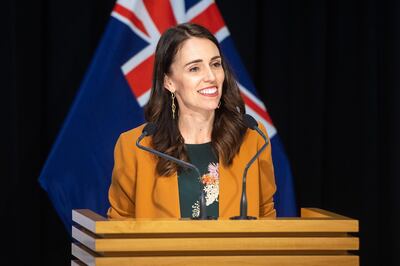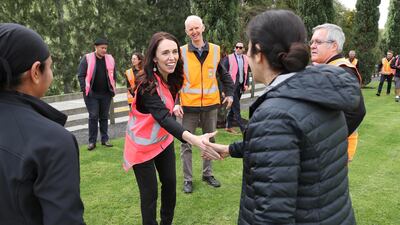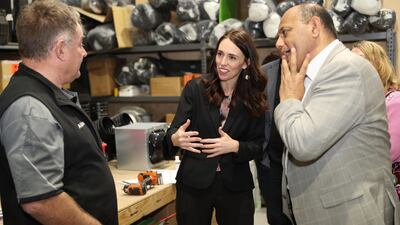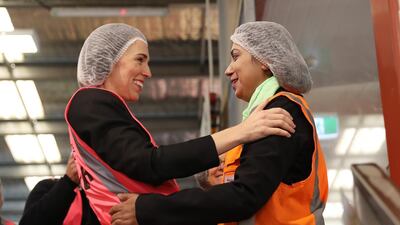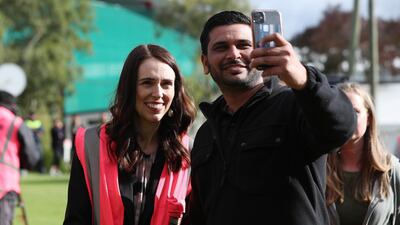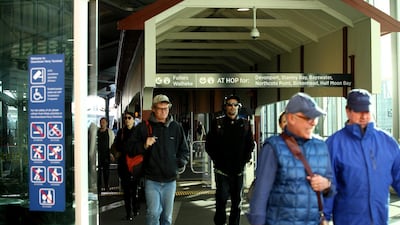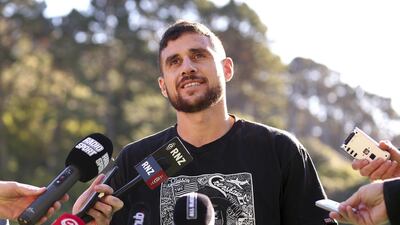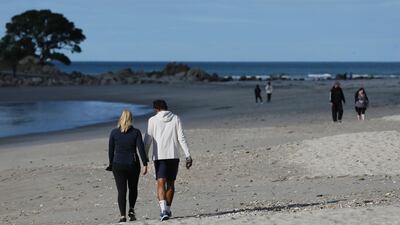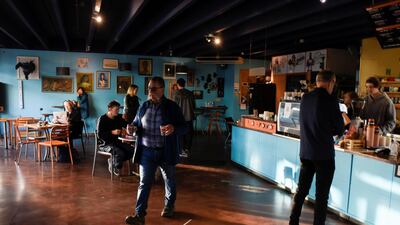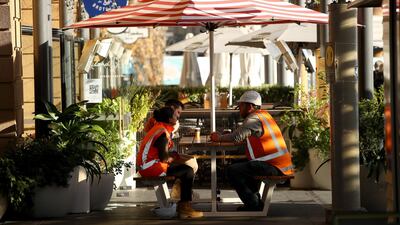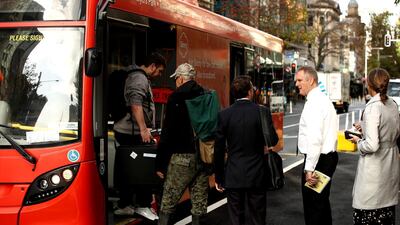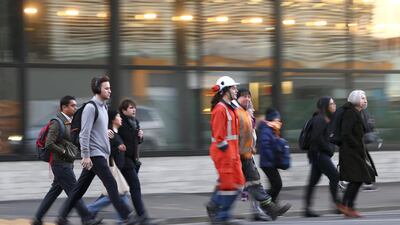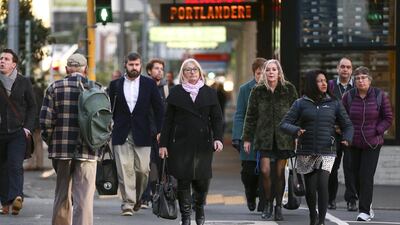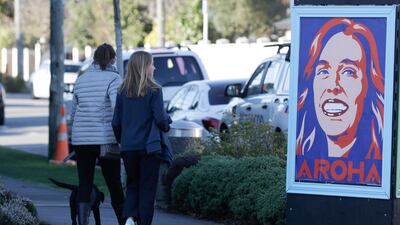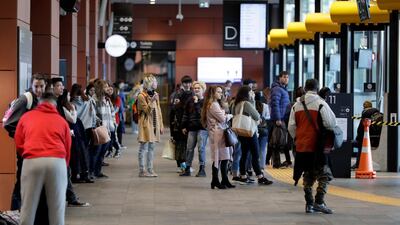This week, New Zealand announced that it seemingly has eradicated the coronavirus from its isles. The country more than flattened the curve. It has annihilated it.
Upon the arrival of this news, unquestioning applause reverberated across the world. However, this belies the tough – and potentially lonely – road that lies ahead for the country.
Until a few months ago, when New Zealanders like me would tell people where we were from, we would be met with a response that was something along the lines of “it's pretty there” – like a grandma looking at a sweet, but unimportant drawing by a grandchild.
Recently though, people have begun to remark about how “proud” we must be, adding something vague but congratulatory about our 39-year-old Prime Minister, Jacinda Ardern.
And there is good reason to be proud. Ms Ardern’s feminine, empathetic leadership means she’s delivering what many hoped for when they voted for her (I voted for her, and I'm glad I did).
But, just like the country she’s from, Ms Ardern’s qualities should not be reduced to a meme. Her decisions have not been perfect. They have pros and cons. She has had an incredibly tough term, to be sure, and New Zealand has had a tough time.
Unprecedented global pandemic aside, last year she had to heal the country after terror attacks in the southern city of Christchurch. That atrocity left 51 people, mostly Muslim worshippers at Friday prayers, dead.
And just six months ago, New Zealand was rocked by the explosion of Whakaari, an island volcano that had been a privately run tourist attraction. Twenty-one people were killed, and the tragedy called into question how tourists were allowed on the island when there had been seismic activity detected. ‘White Island’ was billed as a benign boat ride and a walking tour, rather than a geologically dangerous excursion.
Ms Ardern has dealt with all of this while raising her first child with her partner, Clarke Gayford. When Neve Ardern Gayford, who is about to turn two, was just an infant in 2018, there were murmurs of criticism about the fact she was in the room while her mum spoke at the UN General Assembly. I argued with friends and colleagues who remarked that it was "a bit much". Just under three years into Ms Ardern’s leadership, these few critics and the patriarchy they represent appear frivolous.
Ms Ardern’s role as a mother has never compromised her ability as a leader. In fact, her parenthood has probably benefited her leadership of the country more than her office has benefited her family. I imagine she’s made much personal sacrifice to put the country first during tough times.
New Zealand is a small island nation (which certainly helps in efforts to stamp out a virus that has gone global), but because of this, it relies so much on the outside world for trade, tourism and more.
The lockdown in New Zealand began on March 21, and was only fully lifted this week. Many sacrifices were made by New Zealanders to eradicate coronavirus. Restaurants were closed, even for delivery and even in provinces without a single reported case of the virus. This has been a bitter pill to swallow for many.
The chief economist at ANZ Bank, Sharon Zollner, reminded the Australian Associated Press of the realities facing the country this week: “It's fantastic we don't have any Covid-19 and people are comfortable. They can go to the rugby, they can go dancing, they can go out and about… It doesn't mean we're not going to have a hard recession. There is a tourism-sized hole in our economy."
Her bank predicts that New Zealand's gross domestic product will be 10 per cent smaller this Christmas than it was last year.
New Zealand effectively shut its borders in mid-March. That was the best decision. It saved lives, and even if air borders had been kept wide open, a lack of global appetite for, and ability to, hop on a long-haul flight for a holiday, means the country's tourism would have taken a huge hit anyway.
But how long can they stay closed? The country's current conundrum proves one thing: there is no perfect decision for a politician amid a pandemic
But how long can they stay closed? The country’s current conundrum proves one thing: there is no perfect decision for a politician amid a pandemic.
If a viable vaccine never arrives, does New Zealand shut its borders for good? Does it enforce quarantine for any new arrival forever? Other viruses could emerge in the future. Few New Zealanders are likely to want to undo the months of sacrifice by reopening prematurely, but what if there is no end to the long-term threat?
Surely, New Zealand can't permanently become insular islands, where only those who can quarantine for two weeks are welcome? This would effectively decimate the international tourism industry; in 2019, international tourist spending accounted for 20.4 per cent of New Zealand's export earnings.
Ms Ardern made the best decision she could with the knowledge she had in March. She saved lives. But there were still sacrifices, and the country may have to prepare itself for a change of course in the future if it needs to do so to be able to function connected to the realities of the rest of the world. Ms Ardern clearly realises the country's fight isn't over, writing on Instagram on Tuesday: "we aren’t finished, and while COVID is in the world we’ll have to continue our battle against it."
This week, Singapore’s Prime Minister spoke about how closed borders will affect the world. “Countries will have less stake in each other’s wellbeing,” Lee Hsien Loong said. “They will fight more over how the pie is shared, rather than work together to enlarge the pie for all. It will be a less prosperous world, and also a more troubled one.”
New Zealand’s geography as a set of islands has worked to its advantage during this difficult time. But it cannot be alone at sea forever.
Nyree McFarlane is head of arts and lifestyle at The National
Desert Warrior
Starring: Anthony Mackie, Aiysha Hart, Ben Kingsley
Director: Rupert Wyatt
Rating: 3/5
The specs: 2018 Chevrolet Equinox
Price, base / as tested: Dh76,900 / Dh110,900
Engine: 2.0L, turbocharged in-line four-cylinder
Gearbox: Nine-speed automatic
Power: 252hp @ 5,500rpm
Torque: Torque: 352Nm @ 2,500rpm
Fuel economy, combined: 8.5L / 100km
Result
Arsenal 4
Monreal (51'), Ramsey (82'), Lacazette 85', 89')
West Ham United 1
Arnautovic (64')
States of Passion by Nihad Sirees,
Pushkin Press
UAE jiu-jitsu squad
Men: Hamad Nawad and Khalid Al Balushi (56kg), Omar Al Fadhli and Saeed Al Mazroui (62kg), Taleb Al Kirbi and Humaid Al Kaabi (69kg), Mohammed Al Qubaisi and Saud Al Hammadi (70kg), Khalfan Belhol and Mohammad Haitham Radhi (85kg), Faisal Al Ketbi and Zayed Al Kaabi (94kg)
Women: Wadima Al Yafei and Mahra Al Hanaei (49kg), Bashayer Al Matrooshi and Hessa Al Shamsi (62kg)
Panipat
Director Ashutosh Gowariker
Produced Ashutosh Gowariker, Rohit Shelatkar, Reliance Entertainment
Cast Arjun Kapoor, Sanjay Dutt, Kriti Sanon, Mohnish Behl, Padmini Kolhapure, Zeenat Aman
Rating 3 /5 stars
Red flags
- Promises of high, fixed or 'guaranteed' returns.
- Unregulated structured products or complex investments often used to bypass traditional safeguards.
- Lack of clear information, vague language, no access to audited financials.
- Overseas companies targeting investors in other jurisdictions - this can make legal recovery difficult.
- Hard-selling tactics - creating urgency, offering 'exclusive' deals.
Courtesy: Carol Glynn, founder of Conscious Finance Coaching
Copa del Rey final
Sevilla v Barcelona, Saturday, 11.30pm (UAE), match on Bein Sports
RESULT
Aston Villa 1
Samatta (41')
Manchester City 2
Aguero (20')
Rodri (30')
Director: Laxman Utekar
Cast: Vicky Kaushal, Akshaye Khanna, Diana Penty, Vineet Kumar Singh, Rashmika Mandanna
Rating: 1/5
Three-day coronation
Royal purification
The entire coronation ceremony extends over three days from May 4-6, but Saturday is the one to watch. At the time of 10:09am the royal purification ceremony begins. Wearing a white robe, the king will enter a pavilion at the Grand Palace, where he will be doused in sacred water from five rivers and four ponds in Thailand. In the distant past water was collected from specific rivers in India, reflecting the influential blend of Hindu and Buddhist cosmology on the coronation. Hindu Brahmins and the country's most senior Buddhist monks will be present. Coronation practices can be traced back thousands of years to ancient India.
The crown
Not long after royal purification rites, the king proceeds to the Baisal Daksin Throne Hall where he receives sacred water from eight directions. Symbolically that means he has received legitimacy from all directions of the kingdom. He ascends the Bhadrapitha Throne, where in regal robes he sits under a Nine-Tiered Umbrella of State. Brahmins will hand the monarch the royal regalia, including a wooden sceptre inlaid with gold, a precious stone-encrusted sword believed to have been found in a lake in northern Cambodia, slippers, and a whisk made from yak's hair.
The Great Crown of Victory is the centrepiece. Tiered, gold and weighing 7.3 kilograms, it has a diamond from India at the top. Vajiralongkorn will personally place the crown on his own head and then issues his first royal command.
The audience
On Saturday afternoon, the newly-crowned king is set to grant a "grand audience" to members of the royal family, the privy council, the cabinet and senior officials. Two hours later the king will visit the Temple of the Emerald Buddha, the most sacred space in Thailand, which on normal days is thronged with tourists. He then symbolically moves into the Royal Residence.
The procession
The main element of Sunday's ceremonies, streets across Bangkok's historic heart have been blocked off in preparation for this moment. The king will sit on a royal palanquin carried by soldiers dressed in colourful traditional garb. A 21-gun salute will start the procession. Some 200,000 people are expected to line the seven-kilometre route around the city.
Meet the people
On the last day of the ceremony Rama X will appear on the balcony of Suddhaisavarya Prasad Hall in the Grand Palace at 4:30pm "to receive the good wishes of the people". An hour later, diplomats will be given an audience at the Grand Palace. This is the only time during the ceremony that representatives of foreign governments will greet the king.
Indoor cricket World Cup:
Insportz, Dubai, September 16-23
UAE fixtures:
Men
Saturday, September 16 – 1.45pm, v New Zealand
Sunday, September 17 – 10.30am, v Australia; 3.45pm, v South Africa
Monday, September 18 – 2pm, v England; 7.15pm, v India
Tuesday, September 19 – 12.15pm, v Singapore; 5.30pm, v Sri Lanka
Thursday, September 21 – 2pm v Malaysia
Friday, September 22 – 3.30pm, semi-final
Saturday, September 23 – 3pm, grand final
Women
Saturday, September 16 – 5.15pm, v Australia
Sunday, September 17 – 2pm, v South Africa; 7.15pm, v New Zealand
Monday, September 18 – 5.30pm, v England
Tuesday, September 19 – 10.30am, v New Zealand; 3.45pm, v South Africa
Thursday, September 21 – 12.15pm, v Australia
Friday, September 22 – 1.30pm, semi-final
Saturday, September 23 – 1pm, grand final
Brief scores:
Toss: Nepal, chose to field
UAE 153-6: Shaiman (59), Usman (30); Regmi 2-23
Nepal 132-7: Jora 53 not out; Zahoor 2-17
Result: UAE won by 21 runs
Series: UAE lead 1-0
ADCC AFC Women’s Champions League Group A fixtures
October 3: v Wuhan Jiangda Women’s FC
October 6: v Hyundai Steel Red Angels Women’s FC
October 9: v Sabah FA
Dubai Bling season three
Cast: Loujain Adada, Zeina Khoury, Farhana Bodi, Ebraheem Al Samadi, Mona Kattan, and couples Safa & Fahad Siddiqui and DJ Bliss & Danya Mohammed
Rating: 1/5
GROUPS AND FIXTURES
Group A
UAE, Italy, Japan, Spain
Group B
Egypt, Iran, Mexico, Russia
Tuesday
4.15pm: Italy v Japan
5.30pm: Spain v UAE
6.45pm: Egypt v Russia
8pm: Iran v Mexico
SHADOWS%20AND%20LIGHT%3A%20THE%20EXTRAORDINARY%20LIFE%20OF%20JAMES%20MCBEY
%3Cp%3EAuthor%3A%20Alasdair%20Soussi%3C%2Fp%3E%0A%3Cp%3EPages%3A%20300%3C%2Fp%3E%0A%3Cp%3EPublisher%3A%20Scotland%20Street%20Press%3C%2Fp%3E%0A%3Cp%3EAvailable%3A%20December%201%3C%2Fp%3E%0A
Results
2pm: Handicap Dh 90,000 1,800m; Winner: Majestic Thunder, Tadhg O’Shea (jockey), Satish Seemar (trainer).
2.30pm: Handicap Dh120,000 1,950m; Winner: Just A Penny, Sam Hitchcott, Doug Watson.
3pm: Handicap Dh105,000 1,600m; Winner: Native Appeal, Pat Dobbs, Doug Watson.
3.30pm: Jebel Ali Classic Conditions Dh300,000 1,400m; Winner: Thegreatcollection, Adrie de Vries, Doug Watson.
4pm: Maiden Dh75,000 1,600m; Winner: Oktalgano, Xavier Ziani, Salem bin Ghadayer.
4.30pm: Conditions Dh250,000 1,400m; Winner: Madame Ellingtina, Richard Mullen, Satish Seemar.
5pm: Maiden Dh75,000 1,600m; Winner: Mystery Land, Fabrice Veron, Helal Al Alawi.
5.30pm: Handicap Dh85,000 1,000m; Winner: Shanaghai City, Jesus Rosales, Rashed Bouresly.
The alternatives
• Founded in 2014, Telr is a payment aggregator and gateway with an office in Silicon Oasis. It’s e-commerce entry plan costs Dh349 monthly (plus VAT). QR codes direct customers to an online payment page and merchants can generate payments through messaging apps.
• Business Bay’s Pallapay claims 40,000-plus active merchants who can invoice customers and receive payment by card. Fees range from 1.99 per cent plus Dh1 per transaction depending on payment method and location, such as online or via UAE mobile.
• Tap started in May 2013 in Kuwait, allowing Middle East businesses to bill, accept, receive and make payments online “easier, faster and smoother” via goSell and goCollect. It supports more than 10,000 merchants. Monthly fees range from US$65-100, plus card charges of 2.75-3.75 per cent and Dh1.2 per sale.
• 2checkout’s “all-in-one payment gateway and merchant account” accepts payments in 200-plus markets for 2.4-3.9 per cent, plus a Dh1.2-Dh1.8 currency conversion charge. The US provider processes online shop and mobile transactions and has 17,000-plus active digital commerce users.
• PayPal is probably the best-known online goods payment method - usually used for eBay purchases - but can be used to receive funds, providing everyone’s signed up. Costs from 2.9 per cent plus Dh1.2 per transaction.
MATCH INFO
RB Leipzig 2 (Klostermann 24', Schick 68')
Hertha Berlin 2 (Grujic 9', Piatek 82' pen)
Man of the match Matheus Cunha (Hertha Berlin
Brief scoreline:
Manchester United 2
Rashford 28', Martial 72'
Watford 1
Doucoure 90'
Stats at a glance:
Cost: 1.05 billion pounds (Dh 4.8 billion)
Number in service: 6
Complement 191 (space for up to 285)
Top speed: over 32 knots
Range: Over 7,000 nautical miles
Length 152.4 m
Displacement: 8,700 tonnes
Beam: 21.2 m
Draught: 7.4 m
Dengue%20fever%20symptoms
%3Cp%3EHigh%20fever%20(40%C2%B0C%2F104%C2%B0F)%3Cbr%3ESevere%20headache%3Cbr%3EPain%20behind%20the%20eyes%3Cbr%3EMuscle%20and%20joint%20pains%3Cbr%3ENausea%3Cbr%3EVomiting%3Cbr%3ESwollen%20glands%3Cbr%3ERash%26nbsp%3B%3C%2Fp%3E%0A
Dengue%20fever%20symptoms
%3Cul%3E%0A%3Cli%3EHigh%20fever%3C%2Fli%3E%0A%3Cli%3EIntense%20pain%20behind%20your%20eyes%3C%2Fli%3E%0A%3Cli%3ESevere%20headache%3C%2Fli%3E%0A%3Cli%3EMuscle%20and%20joint%20pains%3C%2Fli%3E%0A%3Cli%3ENausea%3C%2Fli%3E%0A%3Cli%3EVomiting%3C%2Fli%3E%0A%3Cli%3ESwollen%20glands%3C%2Fli%3E%0A%3Cli%3ERash%3C%2Fli%3E%0A%3C%2Ful%3E%0A%3Cp%3EIf%20symptoms%20occur%2C%20they%20usually%20last%20for%20two-seven%20days%3C%2Fp%3E%0A
Dr Amal Khalid Alias revealed a recent case of a woman with daughters, who specifically wanted a boy.
A semen analysis of the father showed abnormal sperm so the couple required IVF.
Out of 21 eggs collected, six were unused leaving 15 suitable for IVF.
A specific procedure was used, called intracytoplasmic sperm injection where a single sperm cell is inserted into the egg.
On day three of the process, 14 embryos were biopsied for gender selection.
The next day, a pre-implantation genetic report revealed four normal male embryos, three female and seven abnormal samples.
Day five of the treatment saw two male embryos transferred to the patient.
The woman recorded a positive pregnancy test two weeks later.
Profile of MoneyFellows
Founder: Ahmed Wadi
Launched: 2016
Employees: 76
Financing stage: Series A ($4 million)
Investors: Partech, Sawari Ventures, 500 Startups, Dubai Angel Investors, Phoenician Fund
ICC Awards for 2021
MEN
Cricketer of the Year – Shaheen Afridi (Pakistan)
T20 Cricketer of the Year – Mohammad Rizwan (Pakistan)
ODI Cricketer of the Year – Babar Azam (Pakistan)
Test Cricketer of the Year – Joe Root (England)
WOMEN
Cricketer of the Year – Smriti Mandhana (India)
ODI Cricketer of the Year – Lizelle Lee (South Africa)
T20 Cricketer of the Year – Tammy Beaumont (England)
Where%20the%20Crawdads%20Sing
%3Cp%3E%3Cstrong%3EDirector%3A%20%3C%2Fstrong%3EOlivia%20Newman%3Cbr%3E%3Cstrong%3EStars%3A%3C%2Fstrong%3E%20Daisy%20Edgar-Jones%2C%20Taylor%20John%20Smith%2C%20Harris%20Dickinson%2C%20David%20Strathairn%3Cbr%3E%3Cstrong%3ERating%3A%3C%2Fstrong%3E%202%2F5%3C%2Fp%3E%0A
Traces%20of%20Enayat
%3Cp%3E%3Cstrong%3EAuthor%3A%3C%2Fstrong%3E%20Iman%20Mersal%3Cbr%3E%3Cstrong%3EPublisher%3A%3C%2Fstrong%3E%20And%20Other%20Stories%3Cbr%3E%3Cstrong%3EPages%3A%3C%2Fstrong%3E%20240%3C%2Fp%3E%0A
